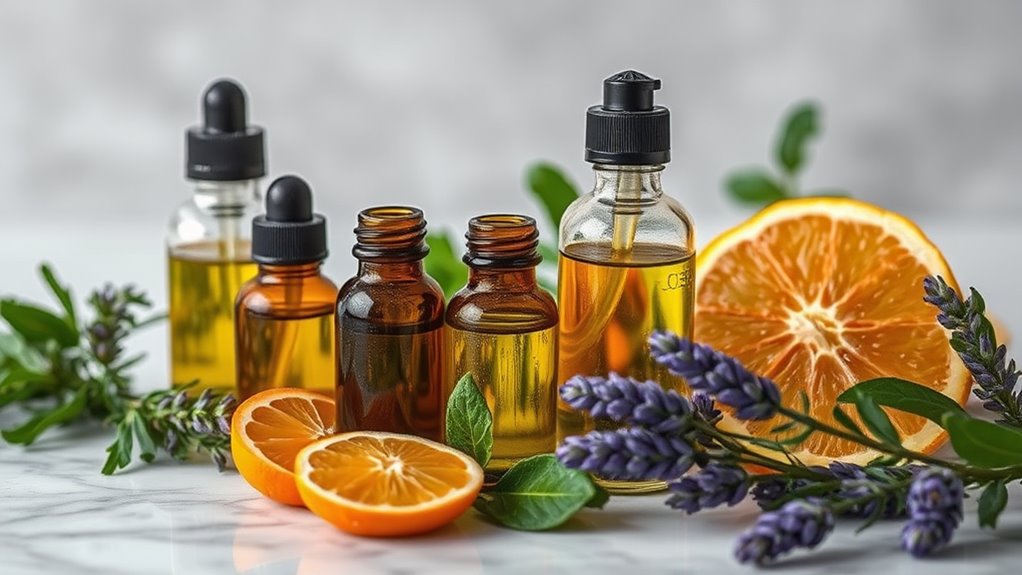What No One Tells You About Essential Oils in Skincare
Essential oils in skincare can be like a double-edged sword; they offer powerful benefits but can also pose hidden dangers. While you might enjoy the soothing scent of lavender or the refreshing zing of tea tree oil, it’s crucial to understand that undiluted oils can lead to irritation or worse. If you want to reap the rewards without the risks, you’ll need to navigate this fragrant landscape carefully. What’s the best way to harness their potential safely?
Key Takeaways
- Essential oils can irritate skin or cause allergic reactions, so always conduct a patch test before full application.
- Some oils increase sun sensitivity, which can lead to sunburn if not used cautiously.
- Diluting essential oils with carrier oils is crucial to minimize adverse reactions and ensure safe application.
- Not all oils are created equal; choosing 100% pure or organic oils ensures better quality and efficacy.
- Essential oils may enhance skincare but should complement a balanced routine, not replace conventional treatments for serious conditions.
The Benefits of Essential Oils for Skin Health
Essential oils have become a skincare powerhouse, offering a natural solution for various skin concerns.
You’ll discover essential oils facts reveal their ability to nourish, rejuvenate, and protect your skin.
For instance, lavender oil calms irritation, while tea tree oil tackles acne effectively.
These oils also possess antioxidant properties, fighting free radicals that accelerate aging.
Incorporating them into your routine can enhance hydration and promote an even skin tone.
Plus, their delightful aromas can elevate your mood, making your skincare regimen a sensory experience.
Additionally, many essential oils are known for their anti-inflammatory properties, which can further aid in soothing skin conditions.
Embrace the benefits of essential oils and transform your skin health naturally, effortlessly, and beautifully.
Common Essential Oils and Their Uses
Here are some common essential oils and their uses you won’t want to miss:
- Lavender: Soothes irritation and promotes relaxation.
- Tea Tree: Fights acne and acts as a natural antiseptic.
- Rosemary: Stimulates circulation and adds a refreshing scent.
- Frankincense: Reduces the appearance of scars and wrinkles.
- Geranium: Balances oil production and improves skin elasticity.
Incorporating these oils can transform your skincare regimen, giving your skin the nourishment it craves. Additionally, it’s important to be aware of the potential risks associated with essential oils, as some may cause irritation or allergic reactions in certain individuals.
Potential Risks and Side Effects
While essential oils can provide numerous benefits for your skin, it’s crucial to understand that they also come with potential risks and side effects.
Some oils may cause irritation or allergic reactions, particularly on sensitive skin.
It’s essential to conduct a patch test before full application.
Additionally, certain oils can increase sun sensitivity, leading to sunburn or pigmentation issues.
Always dilute essential oils with a carrier oil to minimize reactions.
If you’re pregnant, nursing, or have specific health concerns, consult a healthcare professional before using them.
Moreover, be aware that fragrance ingredients in skincare can also provoke similar sensitivities and reactions in some individuals.
How to Choose Quality Essential Oils
How can you ensure the essential oils you choose are of the highest quality?
Selecting premium oils is crucial for effective skincare.
Here are some tips to help you make informed choices:
- Check for purity: Look for oils labeled as 100% pure or organic.
- Inspect the packaging: Dark glass bottles protect oils from light degradation.
- Research the brand: Choose reputable companies with positive reviews.
- Look for plant origin: Quality oils should specify their botanical source.
- Review extraction methods: Steam distillation or cold pressing are preferred methods.
Investing in quality essential oils can elevate your skincare routine! Additionally, combining essential oils with natural skincare remedies can enhance their effectiveness for achieving glowing skin.
Dilution: The Key to Safe Application
Even the highest quality essential oils can be potent and concentrated, making proper dilution vital for safe application on your skin.
Diluting essential oils with a carrier oil, like jojoba or coconut, not only reduces the risk of irritation but also enhances absorption.
A typical dilution ratio is 1-2 drops of essential oil per teaspoon of carrier oil.
By following this guideline, you ensure your skin receives the benefits without harmful side effects.
Remember, it’s better to start with a lower concentration and adjust as needed.
Prioritizing safe dilution helps you enjoy the wonderful world of essential oils without worry. Additionally, be mindful of ingredient conflict as certain essential oils may interact negatively with other active ingredients in your skincare routine.
Essential Oils for Different Skin Types
Choosing the right essential oils for your skin type can make a significant difference in achieving a healthy, radiant complexion. Here’s a quick guide to help you select the perfect oils:
- Dry Skin: Lavender, Sandalwood, or Rose
- Oily Skin: Tea Tree, Lemon, or Peppermint
- Sensitive Skin: Chamomile, Frankincense, or Geranium
- Combination Skin: Ylang-Ylang, Neroli, or Bergamot
- Aging Skin: Myrrh, Carrot Seed, or Patchouli
Hormonal imbalances can also contribute to different skin types, making it essential to address underlying health issues for optimal skincare results.
Tips for Incorporating Essential Oils Into Your Skincare Routine
When incorporating essential oils into your skincare routine, remember that dilution is crucial to prevent irritation and ensure safety. Always select skin-safe oils that cater to your specific skin needs to maximize benefits. Additionally, consider using oils with natural properties that can enhance your skincare regimen and improve overall skin health.
Dilution Is Key
How can you safely enjoy the benefits of essential oils in your skincare routine?
Dilution is key!
Using essential oils undiluted can irritate your skin, so always mix them with a carrier oil.
Here are some tips for effective dilution:
- Use a carrier oil like jojoba or coconut.
- Aim for a 1-2% dilution for facial applications.
- Mix thoroughly to ensure even distribution.
- Perform a patch test before applying widely.
- Store your blends in dark glass bottles to maintain potency.
Choose Skin-Safe Oils
After ensuring your essential oils are properly diluted, it’s time to focus on selecting oils that are gentle and beneficial for your skin.
Opt for skin-safe oils like lavender, tea tree, or chamomile, known for their soothing and healing properties.
Avoid potent oils such as oregano or cinnamon, which can irritate sensitive skin.
Always perform a patch test before incorporating a new oil into your routine.
Remember, the goal is to enhance your skincare, not cause discomfort.

